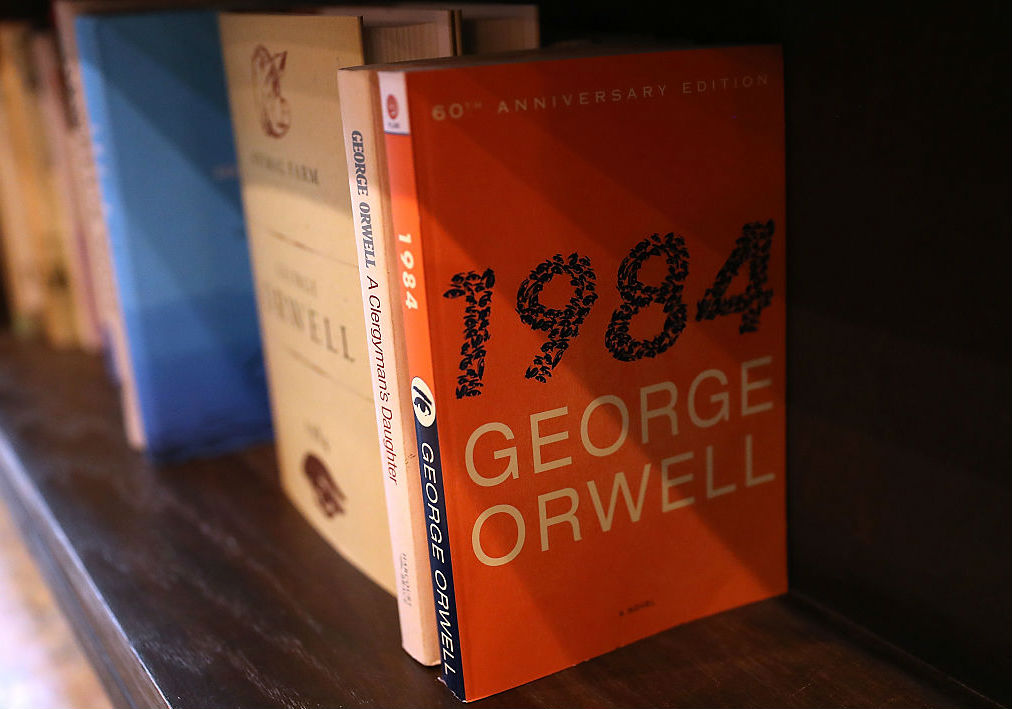Why is George Orwell's 1984 a bestseller again?
US president Donald Trump is a 'boon for sales of dystopian literature'

A free daily email with the biggest news stories of the day – and the best features from TheWeek.com
You are now subscribed
Your newsletter sign-up was successful
It's almost 70 years since George Orwell published his prophetic and nightmarish novel 1984 and now it's shooting up the bestseller lists again.
Sales of the classic skyrocketed by 9,500 per cent after Donald Trump took the Oath of Office last Friday, according to its publisher Penguin USA, which has had to order 75,000 new copies and is even considering another reprint.
Orwell predicted a future authoritarian state, managed completely by "Big Brother", where controlled language known as "Newspeak" limits freedom of thought with restricted grammar, spelling and self-expression.
The Week
Escape your echo chamber. Get the facts behind the news, plus analysis from multiple perspectives.

Sign up for The Week's Free Newsletters
From our morning news briefing to a weekly Good News Newsletter, get the best of The Week delivered directly to your inbox.
From our morning news briefing to a weekly Good News Newsletter, get the best of The Week delivered directly to your inbox.
So why is it striking a cord with so many Americans?
The novel jumped to number one on Amazon's US bestselling book list shortly after Trump's adviser Kellyanne Conway appeared on NBC's Meet the Press on Sunday, notes the New York Times.
In the interview, Conway defended White House press secretary Sean Spicer's disputed claims about Trump's inauguration crowd size, insisting he was not lying but giving "alternative facts".
"Donald Trump may not be a big reader, but he's been a boon for sales of dystopian literature," says the Washington Post, and "by far the greatest beneficiary of our newly piqued national anxiety is George Orwell's 1984."
A free daily email with the biggest news stories of the day – and the best features from TheWeek.com
The newspaper adds: "Leaders have always tried to manipulate the truth, of course, and modern politicians of all persuasions want to 'control the narrative', but there's something freshly audacious about the president's assault on basic math, his effort to assemble from the substance of his vanity hundreds of thousands of fans on the Mall."
Twitter is lighting up with tweets about Orwell's concept of "crimestop", a government confusion tactic whereby public scepticism was deliberately eroded so they would learn not to ask difficult questions, and "reality control", the slow eradication of history in favour of government-approved stories.
Quartz points out that "while we can't be sure that the Trump administration's recent blunders are driving sales of the novel", there is an "eerie reflection" of today's world in 1984.
This isn't the first time sales of the book have jumped. Orwell scholar John Rodden told PBS Newshour that sales increased in the early 1980s under Reagan's administration and also in 2013 after whistle-blower Edward Snowden revealed numerous global surveillance programmes.
-
 Local elections 2026: where are they and who is expected to win?
Local elections 2026: where are they and who is expected to win?The Explainer Labour is braced for heavy losses and U-turn on postponing some council elections hasn’t helped the party’s prospects
-
 6 of the world’s most accessible destinations
6 of the world’s most accessible destinationsThe Week Recommends Experience all of Berlin, Singapore and Sydney
-
 How the FCC’s ‘equal time’ rule works
How the FCC’s ‘equal time’ rule worksIn the Spotlight The law is at the heart of the Colbert-CBS conflict
-
 Local elections 2026: where are they and who is expected to win?
Local elections 2026: where are they and who is expected to win?The Explainer Labour is braced for heavy losses and U-turn on postponing some council elections hasn’t helped the party’s prospects
-
 Witkoff and Kushner tackle Ukraine, Iran in Geneva
Witkoff and Kushner tackle Ukraine, Iran in GenevaSpeed Read Steve Witkoff and Jared Kushner held negotiations aimed at securing a nuclear deal with Iran and an end to Russia’s war in Ukraine
-
 Kurt Olsen: Trump’s ‘Stop the Steal’ lawyer playing a major White House role
Kurt Olsen: Trump’s ‘Stop the Steal’ lawyer playing a major White House roleIn the Spotlight Olsen reportedly has access to significant US intelligence
-
 Trump’s EPA kills legal basis for federal climate policy
Trump’s EPA kills legal basis for federal climate policySpeed Read The government’s authority to regulate several planet-warming pollutants has been repealed
-
 House votes to end Trump’s Canada tariffs
House votes to end Trump’s Canada tariffsSpeed Read Six Republicans joined with Democrats to repeal the president’s tariffs
-
 Bondi, Democrats clash over Epstein in hearing
Bondi, Democrats clash over Epstein in hearingSpeed Read Attorney General Pam Bondi ignored survivors of convicted sex offender Jeffrey Epstein and demanded that Democrats apologize to Trump
-
 How corrupt is the UK?
How corrupt is the UK?The Explainer Decline in standards ‘risks becoming a defining feature of our political culture’ as Britain falls to lowest ever score on global index
-
 Judge blocks Trump suit for Michigan voter rolls
Judge blocks Trump suit for Michigan voter rollsSpeed Read A Trump-appointed federal judge rejected the administration’s demand for voters’ personal data